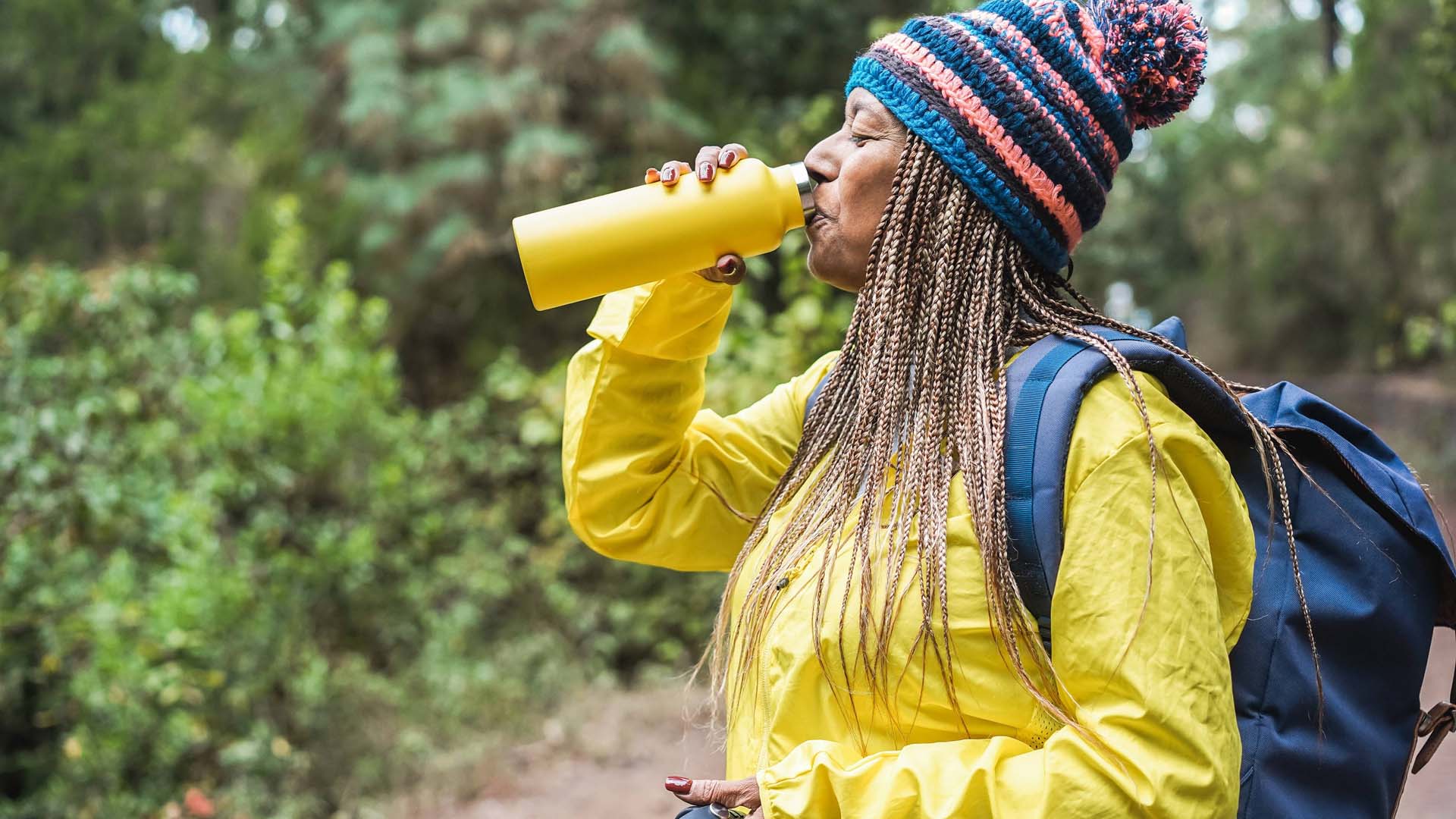Why staying hydrated is so important
An extra glass of water could be the key to keeping you on top form – we explain why staying hydrated is vital as we age.

An extra glass of water could be the key to keeping you on top form – we explain why staying hydrated is vital as we age.

The human body is made up of 55% to 70% water, depending on your age. So it’s not surprising that drinking enough and staying hydrated is crucial to keep your body functioning at its best.
As we age, this could be more important than ever for helping us to live a longer and healthier life.
Results from a 2023 study suggest that people who are sufficiently hydrated may be less likely to develop chronic illnesses or show signs of ageing. Researchers analysed sodium levels in the blood of 15,700 adults, aged 45–66, for 25 years.
Drinking water is important for maintaining normal sodium levels, so the amount of sodium in someone’s blood can be used to measure how hydrated they are. Findings showed that people who had the higher end of a normal range of sodium in their blood had a 39% greater chance of developing chronic illnesses.
They were also 50% more likely to have biological markers of age older than their chronological age. Chronological age is the number of years you've been alive, while biological age refers to the physical age of your cells and tissues.
Lesley Carter, a registered nurse and programme lead at the Malnutrition Task Force, which is supported by Age UK, agrees.
She explains that not having enough fluid can cause an imbalance of electrolytes, such as sodium, which can affect your overall health. “Drink around six to eight glasses or 1.5 litres of fluid per day,” she says.
Your fluid needs can vary and depend on a variety of factors, including your age, lifestyle, body size and climate. Authors of the study did note the need for more studies to confirm the link between hydration and ageing.
Tip for staying hydrated
Download a water tracking app to keep tabs on how much you’re drinking. Water Tracker – Water Reminder is available on Android and Water Tracker – Drink Reminder is available on Apple devices.

Staying hydrated can provide many benefits for your health.
“Fluid is not just about water. If you don’t like water and the thought of drinking eight cups is beyond you, you could have soup instead.”
Carter also suggests a cup of tea or coffee, adding custard to puddings or a stew with gravy, as alternatives.
“Make it work for you. Have things that you enjoy and you can manage."

Some older people or those with chronic illnesses, such as dementia, can experience issues with drinking enough fluid.
Carter says: “As you age, you don't necessarily feel as thirsty or the need to drink as much as you did when you were younger.
“Some people don’t realise how important being hydrated is.”
Another issue, she says, is that those with a weak bladder may worry about being incontinent and choose not to drink so much because of that.
But Carter explains the idea that reducing fluid intake will reduce the amount you’re peeing is a myth. “When you drink less, your kidneys overact, and this can make you pee even more.”
Carter says people with dementia may have forgotten that they haven’t had a drink or that they need to drink throughout the day.
“If they're living alone and they haven't got any reminders, they won't drink.”
Carter’s top hydration tips for older people or those with chronic illnesses
Some people’s throats can get a bit restricted, so they find it difficult to swallow large mouthfuls. Sucking the fluid through a straw helps it trickle down more easily.
This is especially useful if you or someone you know has dementia.
Options include placing a sticky label, with a reminder to drink on it, above the tap or on the cupboard, or setting a phone alarm.
If you or someone you know is less able, make sure that a drink is available and within reach.
The Alzheimer’s Society has more tips on supporting a person with dementia drink enough.
Top takeaway
Get your equivalent of six to eight glasses of fluid per day. “If you don't reach eight glasses one day, don't beat yourself up. Start again tomorrow.”
The Malnutrition Task Force has more advice on managing hydration.
Lesley Carter is a registered nurse and clinical lead for Age UK. She works in Health Influencing and leads Professionals and Practice and the Malnutrition Task Force. Previously, she worked within the Department of Health as the London Lead for the development and implementation of the National Dementia Strategy.
Gemma Harris has been a journalist for more than seven years and is a self-confessed health and wellbeing enthusiast, which led her to specialise in health journalism. During her career, she has worked with top editors and publications in the industry.

We examine the science and how to best look after our brain as we get older.

Want to start winter mornings feeling energised? Follow these five simple tips.

Expert nutritionists break down the most important foods to eat in each decade as we get older.

Your neighbourhood pharmacist now offers a surprising number of services.



10 simple alternative items that can have a big effect on your health – without depriving you.


New measures for GP appointments are in the headlines, but what effect will they have for you when it comes to getting to see a doctor?

Everything you need to know about the lung infection, and how you could be ill with “walking” pneumonia without realising it.